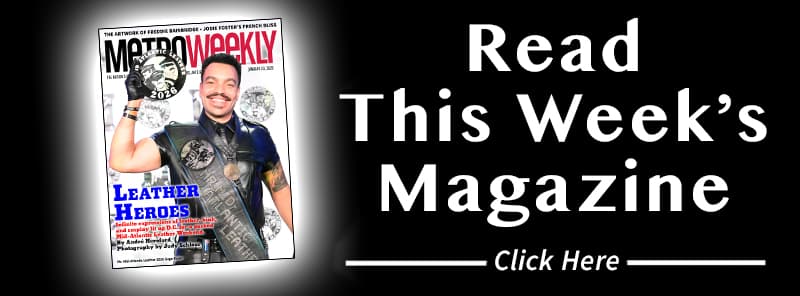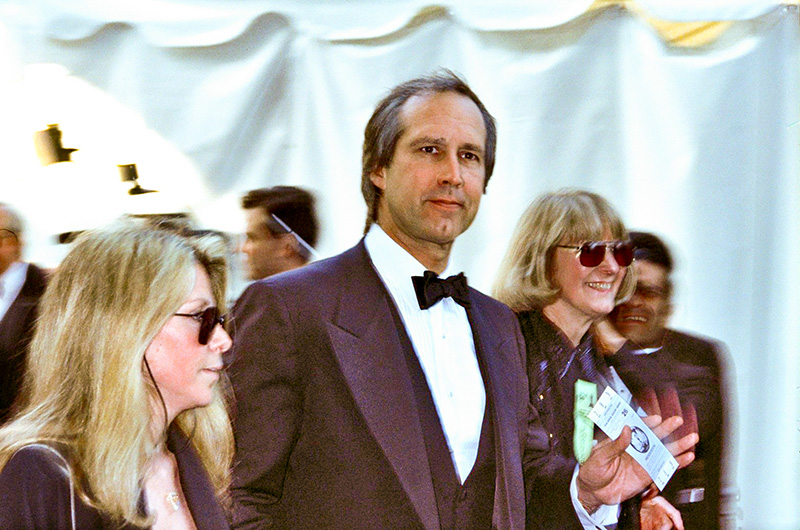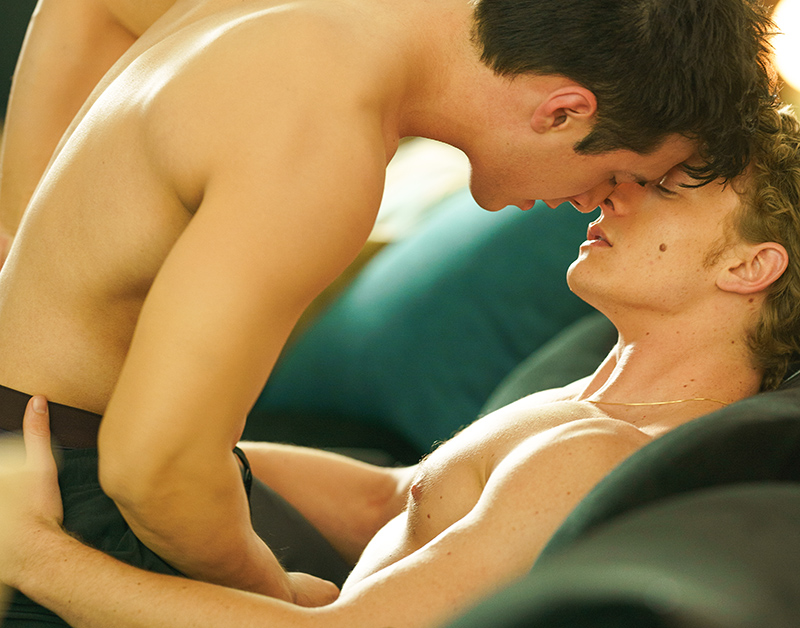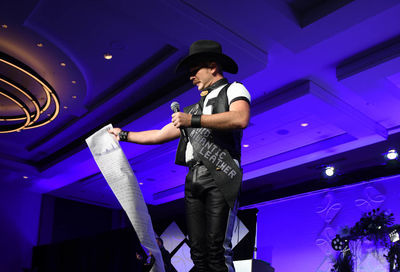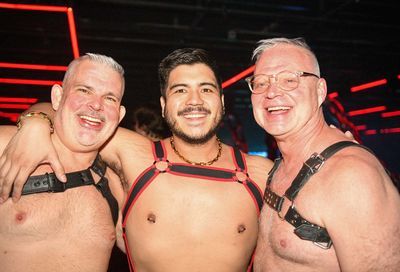Waiting on Fame
Topher Goodman from NBC's 'The Restaurant'
 Topher Goodman Topher Goodman |
There’s a sign posted outside Rocco’s on 22nd Street that reads: THE CAMERAS ARE OFF.
But the television program that is sort of a test bed for a new kind of reality program — one that resembles more of a documentary than a last-person-standing-on-the-island-as-they-dash-madly-to-the-altar — up and running.
The Restaurant, a six-week series that follows celebrity chef Rocco DiSpirito as he struggles to open his latest New York fine dinery, is currently a hit for NBC. And of the people seen regularly on the show, among the most memorable is Topher Goodman — the embodiment of the New York gay actor-waiter. A little bit flamboyant, a little bit sarcastic, a lot outspoken, and very efficient at what he does, Goodman is one of the show’s grabber characters. He holds and maintains our interest.
On the fourth episode, airing this Sunday night at 10 p.m., the 31-year-old undergoes what an network publicist calls “a confidential story arc.” Goodman isn’t allowed to discuss what happens in detail, and in a phone interview last Sunday, before the airing of episode three (in which Goodman is seen rousing the staff in a group disgruntlement session), he takes great pains to avoid revealing anything.
It’s Goodman’s first interview ever with the press, and he’s chatty and charming and forthright. Just what you’d expect from a proud gay man.
Being on television has been a little strange for the former upstate New Yorker. “To see yourself on national television when you’ve been waiting your entire life for it is really mind-boggling,” he says. “At the same time, I don’t know what to do with the information. I love it, but it’s crazy.”
Only time will tell, after The Restaurant has run its course, whether Topher Goodman will become a staple in the diet of our entertainment lives, or will slowly evaporate from the public eye like a glass of tap water standing in the sun. After talking with this engaging go-getter, however, we’ll take a heaping helping of the former.
METRO WEEKLY: Let’s start at the beginning of Topher Goodman’s life — where you’re from, your childhood.
TOPHER GOODMAN: I was born the youngest of four boys and raised in upstate New York in a small town — Waterloo. I had a great family — a very working class family in a small, closed-minded community. Everyone there knew each other. I remember there was only one African American kid in the entire school system. So I felt shut off from the world a little bit there, but I had parents that, once they realized where I was going in life, were completely and totally supportive and have done nothing but make sure I followed what makes me happy.
MW: I’m interested that you call Waterloo a “close-minded community.” Can you expand on that?
TOPHER: All of the best racist jokes you can think of are things that people sit down and share over coffee in Waterloo. But I’m not bitter against my hometown because it’s beautiful place — and it’s the birthplace of Memorial Day.
MW: Did you aspire to be an actor from a young age?
TOPHER: My brother and I started juggling stones in the driveway, which was something my mother decided to capitalize on. So she threw me in some clown makeup and made me my brother’s sidekick. That’s kind of where like the performance aspect of my life started. And I had a definite love for it. I remember being in fifth grade and being handed a lead role in some silly Christmas musical. But it was the first time I stood in front of people. And to have people just applauding, there is magic to that. That somebody gives you the opportunity because they see something in you, puts you out there, and the applause comes — that’s where the magic becomes your love for life.
MW: What did your parents do?
TOPHER: My dad worked at Xerox. My mother went back and forth from working at the local department stores to working at a pizzeria to raising four boys and being a housewife. Our whole family eventually became a troop of clowns — all but my oldest brother, who was having none of it. We did parades and corporate parties and picnics, things like that. It was something we did to raise money to pay the bills and get the school clothes and supplies that we needed. We spent a good solid five years doing that as a business — twisting animal balloons for money.
It was very interesting life for somebody to grow up in rural upstate New York and from the age of eight to fourteen, have your parents get you up at like six or seven o’clock in the morning and put grease paint on your face. I remember feeling like I was doing something really great, but also spending a hot summer day in yarn wig and full body suit and grease paint was not my first choice of how to spend my childhood. At the same time it gave me great performance skills and a great work ethic, so it’s twofold.
MW: Just out of curiosity: How do you feel about clowns today?
TOPHER: [Laughs.] If I never step into a clown outfit again I’ll be happy. It was a great learning experience but there is something weird about clowning. I just remember so many kids actually not wanting a clown near them. There’s a fear factor to it.
MW: What about your coming out? When did the gay lightbulb click on?
TOPHER: I was just about to go off to college in Ithaca and I met a girl who was working on a local musical with my mother. We started dating, which was very convenient because we only had three weeks before we both went our separate ways to college — she was going to Illinois. We decided to spend Spring Break alone together in Toronto, at which point I had to ask somebody what I was supposed to do with a woman. My best friend said, “What have you done so far?” I said, “I accidentally touched her boobs once.” So he gave me the rundown. I went up there and [when it came time], I threw up on her in bed.
When I feel like I’m functioning in a situation that isn’t my truth or is not happy, it goes straight to my stomach and makes me sick. If I’m on a date with somebody and I’m uncomfortable, I get nauseous. I’m a Cancer, astrologically speaking, and things tend to go straight to our stomachs — we’re very emotional that way. I knew I was not supposed to be there in bed with her, touching her. It just wasn’t where I wanted to be. I had a fever of a hundred and four for the rest of the week. And it was completely psychosomatic: The minute I stepped on the train to get out of that town and said goodbye to her, after being in complete and total silence for the week, the fever and nausea went away.
MW: So you had a bad first experience with a girl. That doesn’t make a person gay.
TOPHER: I remember knowing in third grade who the cute boys in my class were — but being gay just wasn’t an option in Waterloo. I remember one gay man who lived in Geneva, the town next over, and everyone knew who he was and did nothing but make fun of him. He was the local joke, basically. Being surrounded by that kind of attitude it just wasn’t an option. It just wasn’t an option to be gay.
It was different when I moved to Ithaca. Ithaca has a very strong gay community. I spent four of the greatest years of my life in a great school in theatre department with amazing teachers, surrounded by other gay people. Started my sophomore year realizing I was in love with my best friend, who turned me down.
MW: Well, that’s always the case.
TOPHER: Yes, it’s always the case. So in the middle of my sophomore year, I started dating one of the techies in the theatre department. We dated for five years, lived together throughout college. I was surrounded by people who allowed me to be myself and it was very easy to come out. My oldest brother is also gay.
MW: The one who wouldn’t put on clown makeup?
TOPHER: The one who wouldn’t put on the clown makeup.
MW: So now we know clown makeup has nothing to do with one’s sexuality.
TOPHER: [Laughs.] And thank god for that! Gay sex in a clown suit would scare the hell out of me.
MW: What brought you to Manhattan?
TOPHER: After college, I went to Massachusetts and worked at a local theatre for a while as a props master, which I had no business doing with my musical theatre-dancing-acting degree. But what gay guy can’t sew some drapes occasionally? I ran screaming out of Springfield, Massachusetts because it is the armpit of America as far as I am concerned. Seedy little town, seedy little town. I went back home after that and said “You know what? It’s time. I can’t sit around.” So my best friend from college and I moved to New York together — packed everything in my dad’s truck and came here with just enough money to pay our first month’s rent.
MW: What was your first waiting job in New York?
TOPHER: Working at a small café in the upper west side — a coffee dessert house where the shifts are from four in the afternoon till four in the morning. People were leaving there making like forty-five to a hundred dollars in tips for twelve hours of work. It was a very mean place. They were so vindictive, they paid the dishwasher, who I believe was an illegal alien of Mexican decent, only a dollar an hour. The guy was there from six o’clock in the morning till three o’clock in the morning! And he was making a dollar an hour! I just thought that was the most horrible thing in the world and no matter how desperate I was, I wasn’t about to work in a place that didn’t have some sense of compassion. My employment there only lasted a few days.
MW: Essentially, however, you consider yourself an actor.
TOPHER: Yes, I am an actor. And a lot of people are skeptical about the fact that actors were hired to do The Restaurant.
 Cast of The Restaurant Cast of The Restaurant |
MW: But so many actors also work as waiters. So it’s not an unusual occurrence.
TOPHER: No. Because waiting tables is the best cash you can get in this town.
MW: So how did The Restaurant come about?
TOPHER: My friend Susanna — who is one of the line cooks on the kitchen; you see her more in the first episode than in the second — heard about it through a friend. We stood in line and just went for it. It all clicked from there. It was completely unexpected. Came out of nowhere.
MW: Out of a thousand hopefuls, why do you think they chose you?
TOPHER: Because I was as honest as I could be. Rocco’s statements, which I reiterated to him, was he was looking for servers with a smile in their heart. I was like, “Gosh there’s somebody who seems really down to Earth that’s going to be in control of this machine.” I’ve been waitering my entire life. I’m at my maximum performance when I’m waitering for some reason. I would rather give a show to strangers coming in to dine than fight [in an audition] to get a show on Broadway. I like to give a show for the everyday human being and try to affect their lives.
But I also think they wanted a great gay character. I think they wanted originally to focus on me as the crazy gay guy. Later, the producers said to me they weren’t quite expecting me to be as multifaceted a human being as I was. But I am emotional, I am sensitive, I do know what I am doing waiting tables in a restaurant, I do have the skills, and I have a good work ethic. I think they got more than they bargained for.
 |
MW: Do you believe they wanted a stereotype?
TOPHER: I think the producers were originally looking for a stereotype. But I made the choice that I don’t want them in the end to edit me down to the crazy bitchy witty gay buffoon. I refused to give them the stereotype that America might be anticipating. I gave them all of me at my greatest truth on a daily basis.
MW: Speaking of truth, on last week’s episode there was this friend of Rocco’s family going on and on about how much better his mother’s meatballs are compared to Rocco’s mother’s, which are served at the restaurant. And then Rocco’s mother comes up, and of course he praises her meatballs to the heavens. Now, we all do that kind of thing from time to time in life, and the intentions may be innocent enough, but we’re not doing it on national television knowing full well that our duplicity might be seen by not only millions of people, but by the recipient of the lie as well.
TOPHER: I can’t believe there was no forethought in that man’s mind. To say that the meatballs at Rocco’s suck and then just lie straight out to Momma is an example of the human condition [at its worst]. I don’t know what people there were thinking. The clientele that came into Rocco’s while the cameras were on were just absolutely despicable. It was a competition to see who could be the biggest idiot because they knew the biggest idiot would get the most camera time.
MW: So far we’ve only seen the soft opening. Talk a little about that.
TOPHER: The soft opening was a two night thing, which restaurants always do when they open up — practice on friends and family first. They were friends and family of Rocco’s, mostly, people who knew him in the business. But friends and family are worse than the people who were in there once the restaurant officially opened — because they were taking advantage of the fact that they were getting a free meal, and that they were going to be on camera. And they just went hog wild as far as not tipping, being greedy, being needy, being rude and acting out for the attention of the cameras.
MW: After the soft opening, did the patrons revert to those you’d generally encounter at any normal restaurant?
TOPHER: It was far from the average New York crowd — especially for the Flatiron District, which is where the restaurant is located. That’s a decent neighborhood. That’s where people with good taste and the money to afford a fine dining experience go out to eat. While we were getting those people, they were doing themselves in because they got excited by the cameras, and it just got completely and totally out of hand.
They were acting out for the cameras. And they weren’t tipping well at all. And they were picking the food apart in a way that customers normally wouldn’t, because they knew if they put down the food, if they harassed the waiter, the cameras would come zooming over to them. The producers took the crème de la crème of the idiots, but a lot of people that came into that restaurant were just mean. We were all under constant judgment by the clientele. And if anyone even stepped close to out of line, we were open prey for chaos and anger.
MW: The young lady who was let go last week, the one who was seen drinking with the customers — it was astonishing to me that she was so brazen about slacking off.
TOPHER: I believe that some people’s intent from the get-go was just to be on a television show. After we were hired and talked to by the producers, I said to the producers flat out, “I think that to be committed to this show is to be committed to the job first.” I’d been working at a restaurant for two and a half years — East of Eighth. I full out quit that job, and went thinking “I’m going to be part of a new restaurant, it’s going to be a popular restaurant, I’m a good waiter, and I’m going to make great money.” Some other people’s intent was to just go in there and get what they could from the show. So it didn’t matter that she drank with customers, because she didn’t really plan on being there beyond the two weeks [of filming].
MW: What was the work environment like? The lighting alone seems intense and harsh.
TOPHER: It was just bright and unsavory. My biggest concern was “Oh, my god, do we really need this much light? Am I slinging food at K-Mart?” Because it felt as bright as a department store. Customers were like, “It’s awfully bright in here.” There was a lack of intimacy to the dining experience — everybody was under heavy lighting and all part of one big, bright crazy experience, so I think that added to the drama, too. Everybody could see everything that was going on, everybody could see each other’s stories, and if somebody was acting out at a table over there and a camera ran over there, somebody would say, “Oh, they got some attention, so I guess all we need to do is bitch about this clam to get the camera over here!”
And then there was the camera always two seconds from my face. I was like, “Are you doing a close-up of my pores?” When every table has broken down and everybody’s yelling and they don’t have their food and those that do, don’t like it and they’re mad, suddenly a camera comes rushing up to you at the computer because you’re freaking out. It’s literally two inches from your face and they’re asking you “What’s going on, Topher? What’s going on? What’s wrong with your tables? Are you in the weeds? Are you in the weeds?” They’re trying to get your story in that moment and it pulls a lot of energy from you. I was going home at the end of the day really, really tired and exhausted. The cameras and the energy of them making a show around your life literally knocks the wind right out of you. But I didn’t dislike it.
MW: It must be a little surreal watching what happened in your life come back to you on television.
TOPHER: It’s kind of like reliving a nightmare and being really excited about something you’ve always wanted to have come true at the same time. The polarity of the situation is mind-boggling to me. Some days I sit and watch the show and it’s almost an out-of-body experience, because I remember what I felt every moment but at the same time it’s like, “God that’s me on that television, and that’s my life.” And seven million people are sitting in their homes across America watching it. Well, that’s what happened that day. That was my life that day. That’s what I did that day.
 Rocco Despirito Rocco Despirito |
MW: What’s Rocco like? Most chefs generally face so much pressure and stress that they don’t usually come off as the nicest people in the world.
TOPHER: There’s a lot of pressure. And in this case, Rocco was under double the pressure — he became a celebrity beyond just being a celebrity chef and that requires a lot more attention to the people and to the media. I think that one of his gravest errors — and you’ll see this on the show, I think — was to stop paying attention to the people he hired, to the running of the business, and to his job as a chef, and pay too much attention to the celebrity world and what he had to do media-wise.
I believe that Rocco is a good person with good intent — I don’t believe he’s a bad person. I do think that things were handled wrongly, and I think that the employees could have been treated better and given the same attention that we were told we would get in the training when he was like a motivational speaker. But when the restaurant’s doors opened and things started to crumble, he stopped paying attention to what we were doing, he stopped paying attention to what we needed and he stopped saying “Okay, this is what went wrong today, let’s fix it for tomorrow.” Which was the level of support we were told we were gonna get.
Most chefs I know have two sides. One’s a really good side — a people side — and one’s a really ugly, yelling, screaming, stressed-out side. I just think that those two sides for Rocco in this elevated situation got more extreme than anybody anticipated — probably even more than he anticipated. He made comments before the show ever started taping that this could either be the best thing he’s done or the worst thing he’s ever done. I think he lost sight of himself in the process and I think that’s coming across on the show.
MW: Still, he’s awfully cute — easy on the eyes. We need to figure out how to get him to play for our team.
TOPHER: [Laughs.] Oh, God, I can’t go down that road. But he said to me at one point, “If I were gay, I would marry you, Topher. If I was to ever change my mind, you would be the person that I would want.”
MW: That’s an awfully sweet thing to say.
TOPHER: It’s a very nice thing to say, but in hindsight thank God we didn’t get married!
MW: You must be referring to the “confidential story arc” involving you in episode four, the one we’re not allowed to discuss.
TOPHER: All I can say is that there’s going to be, I think, a very unexpected turn of events in my character. It was unexpected to me, but it was a moment of truth that we all kind of acted out. I think that it will definitely be a little bit of a surprise to viewers.
MW: What’s Rocco’s momma like?
TOPHER: Old world Italian. She actually reminds me of my great grandmother. She believes in Rocco more than Rocco believes in Rocco. And thank God he has her. She’s the best level of support. If people started complaining, or started having issues or got upset, momma was compassionate. She’d give you a hug, but then she’d say “Get back to work, we don’t have time for this. We all have to work together, we have to work hard. I get up every morning, I’m seventy two years old, if I’m working you’re working.”
MW: Working making those meatballs!
TOPHER: Cranking out those meatballs.
MW: They look delicious. Are they?
TOPHER: I have to say yes, she makes good meatballs. And the woman does cook with love — where she comes from it’s what they do. I think the energy that you put into what you cook, whether you’re feeding other people or feeding yourself adds something to the taste of the food. So I definitely think that she makes really great meatballs. Are they the best in the world? Who cares? At the end of the day, a meatball’s a meatball. But they are definitely good.
MW: And expensive.
TOPHER: I think spaghetti and meatballs for eighteen dollars is a really hard concept for New York foodgoers. There is a dichotomy inside the restaurant of “Alright, we’re working with fine silverware, and we’re resetting between each course, but we’re serving risotto balls — rice balls! — in paper containers.” Resetting silverware between courses while wearing Diesel jeans doesn’t make sense to me. Rocco’s like, “Well, you know, that’s our new concept, we’re trying to fuse worlds.” I just don’t think it’s a workable idea in this case.
 |
MW: You weren’t paid to be on the show. And clearly The Restaurant is different from other reality shows in that there’s no prize, you’re not playing a game, you’re not voting people out of the restaurant.
TOPHER: No, it’s like any other waiting job — minimum wage for servers plus tips. And during that two-week period, the tips were really bad. It started to get a little bit better, but it still was not what I was used to making — especially at a New York restaurant that people were dying to get into. I think everyone involved in that restaurant from the get-go took a severe income cut to be part of it.
MW: But it may be a worthwhile investment down the line.
TOPHER: You live in faith and say “Well, I’m going to do this and regardless whether or not anything comes from this experience. It’s kind of fun that people are watching you get pissed off — there’s a bit of excitement to that. And I had so much fun every day that if it stopped at any point, I had already gotten so much out of it that it didn’t matter.
MW: What’s the best possible thing that could come out of this for you? What is Topher Goodman’s dream?
TOPHER: I enjoy being a waiter, but my dream is that from this experience I will get more work in television. I hope that it’s the first of other things, I’m not gonna lie. I hope that something else comes of this, that I get to do more things. I’m lucky to be one of the people chosen to have that much air time and I’m lucky that my first thing I’ve ever done on television, is just me. And it’s me at what I’ve been doing my whole life — just working and laughing and getting frustrated or getting angry and using every emotion as it comes up and not being afraid to show it, use it and live it.
I don’t need to star in a film, I don’t need to have my own show, but it would be my dream to just get consistent work and be paid for it. So yes, I would love to have a career in television.
MW: Do you worry that if that were to happen, you’ll be typecast?
TOPHER: That’s the biggest problem I have with the business on the television end of things. I talked to a friend of mine who works in an agency in L.A. and she said “You know, I love you, we’ve been friends for years, and I wouldn’t normally say this to you, but should you come out here you may want to tone it down a little bit just to show your versatility.” But my feeling is that’s why I’m really glad that I was portraying myself on television for the first time. Once you stand in front of the world and say, “This is who I am and this is the way that I choose to love and this is the way that I choose to live it out in my life,” I’m sorry, but there’s no going back. I refuse to go back.
I wanted, in being cast in The Restaurant, not to show the stereotype. And I hope that they continue to edit me the way that they’ve been editing me — as a human being who happens to be gay. I honestly would like Hollywood to get a grip and put away casting people based on their stereotypes and for people in the public eye who are obviously gay to stop hiding it. Live your truth. Rosie hid it forever, luckily she came out and grasped that ring. So did Ellen DeGeneres — now she’s getting her own talk show, which I think is great. So there’s progress being made, but I don’t think that we have to wait as individuals to gain that recognition. Recognize me for who I am today and don’t ask me to be somebody else.
The Restaurant airs Sundays at 10 p.m. on NBC through August 24th. You can also visit Tohper’s official website
Support Metro Weekly’s Journalism
These are challenging times for news organizations. And yet it’s crucial we stay active and provide vital resources and information to both our local readers and the world. So won’t you please take a moment and consider supporting Metro Weekly with a membership? For as little as $5 a month, you can help ensure Metro Weekly magazine and MetroWeekly.com remain free, viable resources as we provide the best, most diverse, culturally-resonant LGBTQ coverage in both the D.C. region and around the world. Memberships come with exclusive perks and discounts, your own personal digital delivery of each week’s magazine (and an archive), access to our Member's Lounge when it launches this fall, and exclusive members-only items like Metro Weekly Membership Mugs and Tote Bags! Check out all our membership levels here and please join us today!







